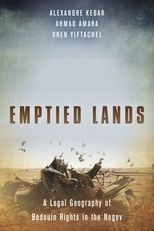 Emptied Lands: A Legal Geography of Bedouin Rights in the Negev
Emptied Lands: A Legal Geography of Bedouin Rights in the Negev
Contents
-
-
-
-
-
-
-
-
-
-
-
-
-
-
9.1 State Policies and Plans 9.1 State Policies and Plans
-
9.1.1 Negotiating Land Rights in the Shadow of the Albeck Committee 9.1.1 Negotiating Land Rights in the Shadow of the Albeck Committee
-
9.1.2 Planning Policies 9.1.2 Planning Policies
-
9.1.3 Spatial Plans for the Negev 9.1.3 Spatial Plans for the Negev
-
9.1.4 The Plans 9.1.4 The Plans
-
National Plans National Plans
-
District and Metropolitan Plans District and Metropolitan Plans
-
-
9.1.5 Governmental Commissions 9.1.5 Governmental Commissions
-
9.1.6 The Goldberg Commission 9.1.6 The Goldberg Commission
-
9.1.7 From Goldberg to Prawer 9.1.7 From Goldberg to Prawer
-
9.1.8 The Prawer Bill 9.1.8 The Prawer Bill
-
9.1.9 Planning Recommendations of the Prawer-Begin Strategy 9.1.9 Planning Recommendations of the Prawer-Begin Strategy
-
9.1.10 Prawer in Suspension 9.1.10 Prawer in Suspension
-
-
9.2 Seeking Planning Solutions: Bedouin Resistance and Counterplanning 9.2 Seeking Planning Solutions: Bedouin Resistance and Counterplanning
-
9.2.1 Mobilization of the Indigenous 9.2.1 Mobilization of the Indigenous
-
9.2.2 Regional Council of the Unrecognized Villages 9.2.2 Regional Council of the Unrecognized Villages
-
9.2.3 The RCUV Alternative Plan 9.2.3 The RCUV Alternative Plan
-
9.2.4 Planning Terra Nullius: An Overview 9.2.4 Planning Terra Nullius: An Overview
-
-
-
-
-
-
9 State and Bedouin Policies and Plans
Get access-
Published:February 2018
Cite
Abstract
Among the most contested facets of the conflict between the state and the Bedouins are land ownership and recognition of 46 “unrecognized” or partly recognized localities. This chapter completes the picture by addressing the question of planning and the Bedouin unrecognized villages. Since 1948, the Israeli government has persistently and forcefully attempted to urbanize the Bedouins and concentrate them in a few urban centers. Such practices involved displacements, house demolitions, and zoning practices that produced an “illegal” geography and “gray spacing” that exposed the Bedouins to constant threat of demolition and eviction. The chapter outlines the various plans, commissions, and development and zoning plans introduced by the government, as well as the alternative plans and visions offered by the Bedouins communities, in an effort to protect their homes, localities and lands. Such alternative planning serves as a foundation for long-term reconciliation and coexistence between settler and indigenous groups.
Sign in
Personal account
- Sign in with email/username & password
- Get email alerts
- Save searches
- Purchase content
- Activate your purchase/trial code
- Add your ORCID iD
Purchase
Our books are available by subscription or purchase to libraries and institutions.
Purchasing information| Month: | Total Views: |
|---|---|
| March 2024 | 3 |
| June 2024 | 1 |
| July 2024 | 2 |
| August 2024 | 1 |
| September 2024 | 2 |
| February 2025 | 2 |
| March 2025 | 2 |
| April 2025 | 1 |


Get help with access
Institutional access
Access to content on Oxford Academic is often provided through institutional subscriptions and purchases. If you are a member of an institution with an active account, you may be able to access content in one of the following ways:
IP based access
Typically, access is provided across an institutional network to a range of IP addresses. This authentication occurs automatically, and it is not possible to sign out of an IP authenticated account.
Sign in through your institution
Choose this option to get remote access when outside your institution. Shibboleth/Open Athens technology is used to provide single sign-on between your institution’s website and Oxford Academic.
If your institution is not listed or you cannot sign in to your institution’s website, please contact your librarian or administrator.
Sign in with a library card
Enter your library card number to sign in. If you cannot sign in, please contact your librarian.
Society Members
Society member access to a journal is achieved in one of the following ways:
Sign in through society site
Many societies offer single sign-on between the society website and Oxford Academic. If you see ‘Sign in through society site’ in the sign in pane within a journal:
If you do not have a society account or have forgotten your username or password, please contact your society.
Sign in using a personal account
Some societies use Oxford Academic personal accounts to provide access to their members. See below.
Personal account
A personal account can be used to get email alerts, save searches, purchase content, and activate subscriptions.
Some societies use Oxford Academic personal accounts to provide access to their members.
Viewing your signed in accounts
Click the account icon in the top right to:
Signed in but can't access content
Oxford Academic is home to a wide variety of products. The institutional subscription may not cover the content that you are trying to access. If you believe you should have access to that content, please contact your librarian.
Institutional account management
For librarians and administrators, your personal account also provides access to institutional account management. Here you will find options to view and activate subscriptions, manage institutional settings and access options, access usage statistics, and more.